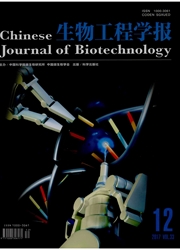

 中文摘要:
中文摘要:
基于液滴微流控芯片的检测和筛选系统,因其具有通量高、成本低等显著特点,近年来备受关注。该系统生成的微液滴(皮升体积)具有直径均一、大小可控、互不交融(单分散性)等特性,它作为微反应器可以进行微生物及其代谢物包埋实验和高通量检测。因此,研究微波滴的相关特性及其应用具有重要意义。文中在液滴微流控芯片系统搭建的基础上,对重要氨基酸(谷氨酸、苯丙氨酸、色氨酸和酪氨酸)分别进行了微液滴包埋实验,研究了包埋微液滴的重要特性参数(如稳定性、扩散性等),探索了包埋微液滴对氨基酸检测分选的应用。实验表明,文中搭建的液滴微流控芯片系统可以稳定、均一地生成微液滴,微液滴大小可根据需要控制在20—50μm之间,微液滴间无交叉污染,包埋氨基酸的微液滴的检测筛选速度大约为每分钟600个。这个研究为高通量分析和筛选产氨基酸的微生物奠定了基础。
 英文摘要:
英文摘要:
Recently, the droplet microfluidic system attracts interests due to its high throughput and low cost to detect and screen. The picoliter micro-droplets from droplet microfluidics are uniform with respect to the size and shape, and could be used as monodispensed micro-reactors for encapsulation and detection of single cell or its metabolites. Therefore, it is indispensable to characterize micro-droplet and its application from droplet microfluidic system. We first constructed the custom-designed droplet microfluidic system for generating micro-droplets, and then used the micro-droplets to encapsulate important amino acids such as glutamic acid, phenylalanine, tryptophan or tyrosine to test the droplets' properties, including the stability, diffusivity and bio-eompatibility for investigating its application for amino acid detection and sorting. The custom-designed droplet microfluidic system could generate the uniformed micro-droplets with a controllable size between 20 to 50 ~tm. The micro-droplets could be stable for more than 20 h without cross-contamination or fusion each other. The throughput of detection and sorting of the system is about 600 micro-droplets per minute. This study provides a high-throughput platform for the analysis and screening of amino acid-producing microorganisms.
 同期刊论文项目
同期刊论文项目
 同项目期刊论文
同项目期刊论文
 A Robust Microfluidic Device for the Synthesis and Crystal Growth of Organometallic Polymers with Hi
A Robust Microfluidic Device for the Synthesis and Crystal Growth of Organometallic Polymers with Hi An integrated microfluidic device utilizing dielectrophoresis and multiplex array PCR for point-of-c
An integrated microfluidic device utilizing dielectrophoresis and multiplex array PCR for point-of-c 期刊信息
期刊信息
